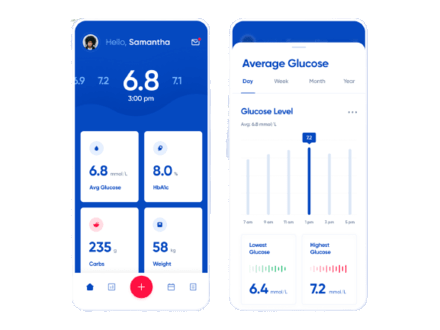Specialized Diabetes Kidney Care Program | Best Diabetic Nephropathy Trainer
- Affordable & best treatment by top-rated health coaches/ doctors
- Online/offline fitness consultation for patients starting at 500 rupees.
- Diabetic Kidney care/treatment via Virtual care, Mobile tracking, Tele-consultations, and in-person meeting available 24/7
Book Online Counseling
Book Appointment or Video Consultation online with top diabetes doctors
Model Of Diabetes Mantra For Diabetic Kidney Care
Real-time plan
Step-by-step guide
Diabetes Mantra tries to train individuals with diabetic nephropathy improving skills such as a healthy diet, exercise, and regular blood level check-ups.
Specialized Team of experts
We have a specialized team of doctors who have done a lot of research on diabetic kidney care and successfully improved the health of a lot of patients

The world’s best diabetes clinic in your pocket
Our medical providers and health coaches are available on a near real-time basis through an easy-to-use mobile application. Our advancements in technology and data science enable expert care and personalized care plans for all of our patients.
How it Works?

Signup for Diabetes program
Just complete a simple 5-minute online application to check your eligibility for the program and enrol.

Meet your care team
We’ll connect you with a Diabetes specialist who will be available 24/7 to you via call or chat.

Connect to our app
Follow suggestions provided by the app and your coach to beat diabetes. Track your progress in the app
Diabetes Kidney Care
If you’re facing diabetes, then it becomes important for you to take care of the kidney. Diabetic kidney disease is a disease that causes due to diabetes and it is called the term “Diabetic Nephropathy”. Type -1 and Type-2 diabetes are the most common cause of kidney diseases. Diabetic kidney diseases are also called DKD, chronic kidney diseases, CKD, kidney diseases of diabetes, or diabetic nephropathy.
About 1 out of 3 people develop kidney problems when facing diabetes. When you’re facing diabetic nephropathy then it disturbs the kidney’s ability to work in the removal of waste products and extra fluid from the body. If not treated, the condition will slowly damage the kidney’s filtering system.
GFR means glomerular filtration stage that measures the level of kidney function and damage. The doctor can calculate it through the results of blood creatinine test, age, body diseases, and gender. The GFR number will indicate that how much your kidney function. As the GFR number goes down in number, the worst is kidney disease.
There are 5 stages of Diabetic Kidney disease:
| Stages | Kidney Damage | GFR |
| Stage 1 | Kidney Damage with normal kidney function | 90 or higher |
| Stage 2 | Kidney damage with mild loss of kidney function | 89 to 60 |
| Stage 3 A | Mild to moderate loss of kidney function | 59 to 45 |
| Stage 3 B | Moderate to severe kidney function | 44 to 30 |
| Stage 4 | Severe loss of kidney function | 29 to 15 |
| Stage 5 | Kidney Failure | Less than 15 |
Treatment
If treated early, it can delay or prevent the onset of diabetic nephropathy. The goal of providing the treatment is to maintain blood sugar and glucose level in the body which sometimes involves the intake of medication. There are various ways doctors provide the treatment depending upon the condition and severity of the patient:
- Drug treatment – Medications such as angiotensin converting enzyme (ACE) Inhibitors or Angiotension receptor blockers (ACB) helps in lowering blood pressure, sugar level, protect kidney function.
- Dietary changes – If a person has kidney diseases, the doctor will ask you to make some dietary changes and add nutrients such as sodium, protein, phosphorous, and potassium.
- If diabetic neuropathy gets into a critical stage, then the patient would need either dialysis or a kidney transplant. The process of dialysis is a life-long process, and can only be stopped by a kidney transplant.
Kidney dialysis is a procedure in which a machine is used to separate waste products from the body and remove them from blood. The process of dialysis acts as a healthy kidney. There are various type of dialysis –
- Hemodialysis – In this type, the blood leaves the body when a needle is inserted and then passes through a tube to a dialysis machine. The blood is filtered in the machine and blood gets to return back to the body and tube.
- Peritoneal dialysis – This method uses the lining of the abdomen or peritoneum (a membrane that forms the lining of the abdominal cavity or coelom in amniotes) fluid to enter through a catheter. The fluid enters the body and filters the waste products before draining them out. The draining process will take 30-40 minutes.
Kidney Transplant
The doctor may recommend a kidney transplant, at a final stage and if a suitable donor can provide you with a kidney. Sometimes, people donate their kidneys to their loved ones and you can live your life with one kidney. And it is said that the transplant from the family member has the best chances of accepting the kidney to the patient.
The person accepting the kidney transplant will need to take medication to reduce the risk of the body rejecting the kidney. One of the side effects patients get after the completion of a kidney transplant is a risk of infection.
Top Diabetes Doctors at DiabetesMantra




10,000+ Happy Patients from Mumbai & the world

Nitin Batra
Frequently Ask Questions
In the starting phase of diabetic kidney diseases, the symptoms are not been show. But as the time-continuous, the situation starts getting worse and the symptoms that are shown are as given below:
- Tiredness
- Loss of appetite
- Weight loss
- Muscle cramps
- Dry and itchy skin
- Puffiness around skin
- Swollen feet and ankles
The causes of diabetic kidney diseases are:
- Diabetes
- Obesity
- High blood pressure
- High cholesterol
- Smoking
- Cardiovascular diseases
The risk factors of diabetic kidney diseases:
- High glucose level in blood
- High albumin level in urine
- High cholesterol
- High blood pressure
- Unhealthy eating habits
- Obesity
Diabetic kidney diseases are prevented by the following steps:
- Maintaining the glucose level in your body
- Healthy blood circulation system by eating food that has rich fiber in it
- Avoid products that are of alcohol and tobacco
- Exercise regularly to maintain healthy body weight
- Watching the A1C level of your body
Diabetic nephropathy is a diagnosis using a number of tests: Urine tests: To check protein level, an abnormally high protein in the urine is the first indicator of diabetic nephropathy Blood pressure: Regular check-ups of blood pressure is necessary steps to check diabetic nephropathy Blood test: This test is used whether the kidney is functioning properly or not. Kidney ultrasound: It enables the size of kidneys to be imaged and sees the arteries to be checked if they’re getting narrow.
Complications of diabetic nephropathy may develop over months or years which may include:
- Fluid retention eventually results in swelling in the arms, legs, or fluid in the lungs.
- Rise in potassium level in the body is called hyperkalemia
- Diseases related to heart and blood vessel which could lead to heart attack or stroke.
- Damage to the blood vessel of the retina is called diabetic retinopathy
- Pregnancy complications that could lead to risk for mother and developing fetus
Our health coaches/doctors will work with you 24/7 to help you achieve the goal with a combination of a healthy diet & medication. The program would include exercise tips and an effective diet plan.
